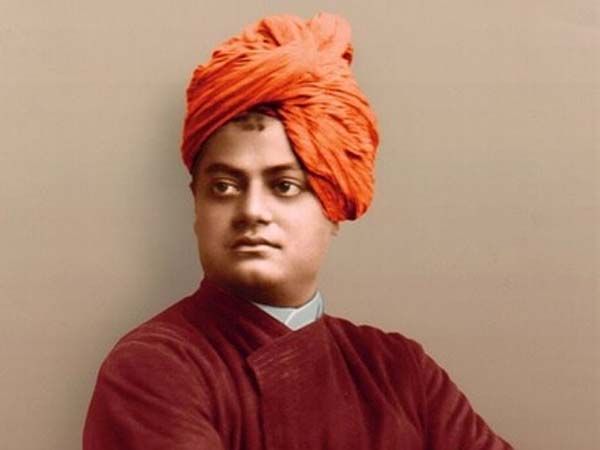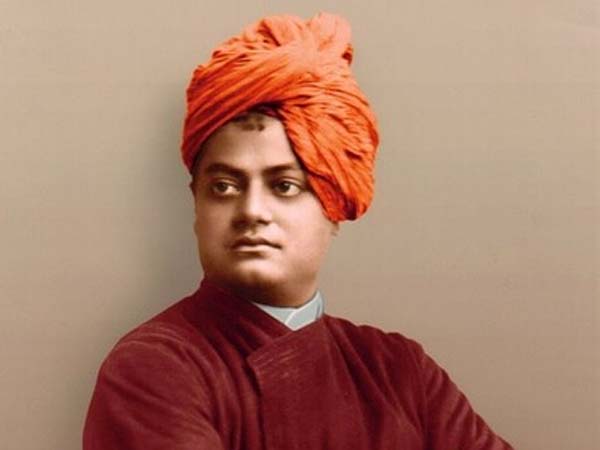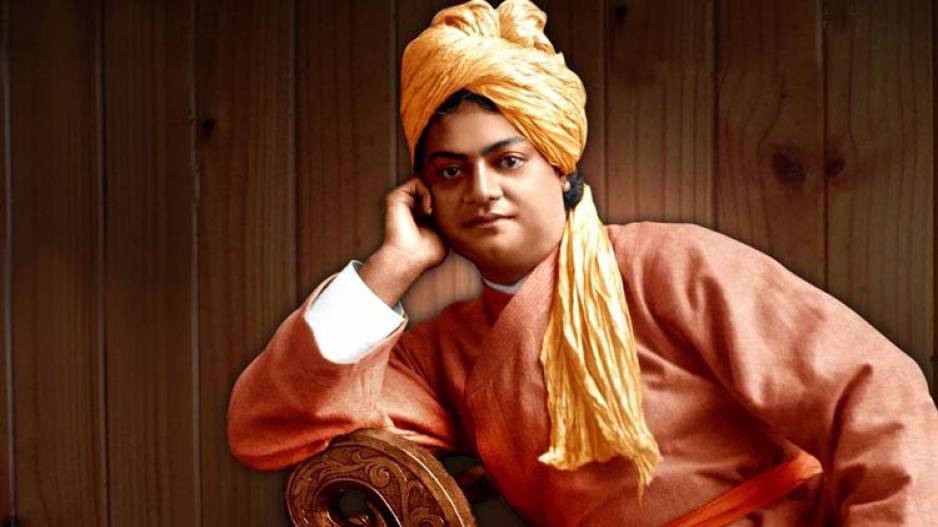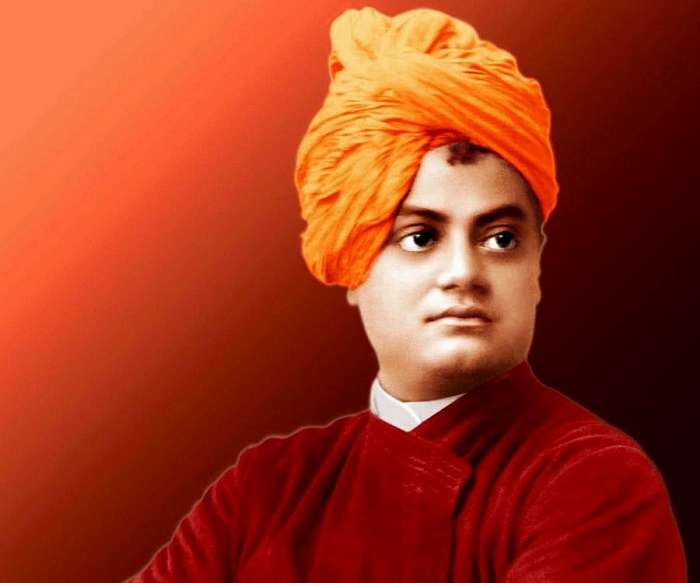-
Dec, Thu, 2023
Swami Vivekananda Biography : Early Life, Education, Works, Teachings and Famous Quotes
Swami Vivekananda Biography : Early Life, Education, Works, Teachings and Famous Quotes
Table of Contents
Swami Vivekananda, born Narendranath Datta on January 12, 1863, in Calcutta, India, was a prominent Hindu spiritual leader, philosopher, and key figure in the revival of Hinduism and Indian nationalism in the late 19th century. His life is an inspiring story of spiritual quest, dedication to service, and a deep commitment to uplifting humanity.

Early Life and Education: Narendranath, known as Naren, was born into an affluent Bengali family. From a young age, he displayed a curious and questioning mind. He was academically bright and excelled in studies.
Encounter with Sri Ramakrishna: In his youth, Naren met Sri Ramakrishna Paramahamsa, a revered saint, and became deeply influenced by his teachings and spiritual wisdom. Ramakrishna recognized Naren’s spiritual potential and became his guru.
Spiritual Quest and Transformation: Under Ramakrishna’s guidance, Naren’s spiritual quest intensified. He underwent various spiritual practices and experiences, culminating in a profound spiritual awakening after Ramakrishna’s passing.
Chicago Address at World’s Parliament of Religions: In 1893, Swami Vivekananda represented Hinduism at the World’s Parliament of Religions in Chicago. His famous opening words, “Sisters and Brothers of America,” captivated the audience and introduced Hindu philosophy to the Western world, advocating religious tolerance and universal acceptance.
Establishment of Ramakrishna Mission and Math: After his return to India, Swami Vivekananda founded the Ramakrishna Math and Mission in 1897, dedicated to the service of humanity, education, and spiritual teachings. The mission aimed to uplift the masses, regardless of caste, creed, or religion.
Teachings and Philosophy: Vivekananda’s teachings revolved around Vedanta philosophy, emphasizing the divinity within each individual, the concept of universal harmony, and the importance of selfless service (seva) for spiritual growth.
Social Reforms and Women Empowerment: He advocated for social reforms, women’s rights, and the upliftment of the marginalized sections of society. Swami Vivekananda believed in the inherent strength of the masses and worked towards their empowerment.
Travel and Lectures: Vivekananda traveled extensively across India and the West, delivering lectures, engaging with intellectuals, and spreading the message of spiritual unity and universal brotherhood.
Passing and Legacy: Swami Vivekananda passed away at a young age of 39 on July 4, 1902. Despite his relatively short life, his teachings, philosophy, and vision for a harmonious world continue to inspire millions globally.
Swami Vivekananda’s life exemplified a harmonious blend of spirituality, social service, and a deep love for humanity. His teachings on Vedanta, spiritual enlightenment, and service to mankind remain relevant and influential in the modern world.
Meeting Ramakrishna Paramahamsa: Swami Vivekananda’s life changed profoundly when he met his guru, Sri Ramakrishna Paramahamsa, who later became a significant influence on his spiritual development. The relationship between Vivekananda and Ramakrishna exemplifies the deep guru-disciple bond and spiritual quest.
Parliament of Religions in Chicago: One of the most iconic incidents was Swami Vivekananda’s historic speech at the World’s Parliament of Religions in Chicago in 1893. His address, beginning with “Sisters and Brothers of America,” introduced Hindu philosophy and spirituality to the Western world, emphasizing the idea of religious tolerance and universal acceptance.
The Encounter with an Atheist: There’s a well-known story of Vivekananda engaging in a dialogue with an atheist on the existence of God. Rather than arguing, Vivekananda listened to the man’s opinions patiently and with respect, demonstrating his tolerance and respect for diverse viewpoints.
Discourse on Service to Humanity: Swami Vivekananda emphasized the significance of service to humanity. He once said, “They alone live who live for others; the rest are more dead than alive.” His teachings on selfless service and compassion continue to inspire people globally.
Advice on Education: Vivekananda believed in holistic education that combines academics with character-building and practical knowledge. His emphasis on educating young minds to develop strength, compassion, and a sense of duty remains influential.
Encouraging Women Empowerment: Swami Vivekananda was an advocate for women’s rights and empowerment. He emphasized that a nation’s progress is impossible without the active participation of women.
Spiritual Teachings on Vedanta: Vivekananda’s teachings on Vedanta, emphasizing the universal principle of oneness and the divinity within every individual, continue to influence spiritual seekers worldwide.
Interaction with Western Intellectuals: Swami Vivekananda had discussions with various Western intellectuals and leaders, including Nikola Tesla and Jamsetji Tata. These interactions showcased his ability to bridge Eastern and Western philosophies.
Establishment of Ramakrishna Mission: After Ramakrishna Paramahamsa’s passing, Swami Vivekananda founded the Ramakrishna Mission, dedicated to service, education, and spiritual teachings. The mission continues its work globally.
Legacy and Enduring Influence: Swami Vivekananda’s teachings, philosophy, and vision for a harmonious and spiritually enlightened world continue to inspire people across generations, promoting peace, harmony, and spiritual growth.
These stories reflect various aspects of Swami Vivekananda’s life, teachings, and impact, demonstrating his enduring influence on spirituality, philosophy, and social welfare.
Swami Vivekananda, born as Narendranath Datta on January 12, 1863, in Calcutta, Bengal Presidency, British India (now Kolkata, India), hailed from a family with a rich heritage and intellectual background. His upbringing and family environment played a crucial role in shaping his early life and intellectual pursuits.
Here’s an overview of Swami Vivekananda’s background:
Family Background: Swami Vivekananda was born into an affluent Bengali family. His father, Vishwanath Datta, was a lawyer by profession, and his mother, Bhuvaneshwari Devi, was a devout housewife. The family had a strong cultural and intellectual atmosphere that fostered a love for literature, music, and spiritual discourse.
Early Life and Education: Narendranath, as he was known in his childhood, received a well-rounded education. He showed intellectual curiosity and an early inclination towards spirituality, philosophy, and Indian scriptures even from a young age. His mother’s influence in nurturing his spiritual bent was significant.
Influence of Ramakrishna Paramahamsa: One of the pivotal influences on Vivekananda’s life was his encounter with Sri Ramakrishna Paramahamsa, a revered saint of Dakshineswar Kali Temple near Kolkata. Ramakrishna recognized Narendranath’s spiritual potential and became his guru. This association profoundly impacted Vivekananda’s spiritual journey.
Quest for Spiritual Enlightenment: Under the guidance of Ramakrishna, Narendranath underwent various spiritual experiences and practices, exploring different paths to realize the ultimate truth. His quest for spiritual enlightenment and understanding of the true nature of existence intensified during this period.
Impact of Socio-religious Milieu: Swami Vivekananda grew up in a time of socio-religious reform movements in India. The atmosphere was charged with discussions on spirituality, religion, social reforms, and the struggle for India’s independence from British colonial rule. These influences deeply affected his thinking and later advocacy for social reforms and spiritual unity.
Swami Vivekananda’s background, rooted in a family environment that encouraged intellectual pursuits and spiritual exploration, laid the foundation for his later endeavors as a spiritual leader, philosopher, and social reformer. His early life experiences and encounters significantly shaped his spiritual quest and worldview, guiding him towards his later role as a prominent figure in India’s spiritual and cultural renaissance.
Death of Swami Vivekananda
Swami Vivekananda, the revered Hindu spiritual leader and philosopher, passed away at a relatively young age. His death occurred on July 4, 1902, in Belur Math, near Kolkata (formerly Calcutta), India.
Swami Vivekananda’s health had been deteriorating for some time due to various factors, including extensive travel, rigorous lecturing schedules, and the toll of his spiritual and humanitarian work. He had been experiencing declining health for several years before his passing.
On July 4, 1902, Swami Vivekananda meditated for a prolonged period at the Belur Math monastery. Later that day, his disciples found him in a state of deep meditation, but upon attempting to rouse him, they discovered that he had attained Mahasamadhi, a yogic state where a realized soul consciously leaves the body.
Swami Vivekananda’s passing was mourned by countless admirers, disciples, and followers in India and around the world. His teachings, philosophy, and vision for spiritual unity and universal brotherhood continue to influence and inspire people across generations. His legacy remains a guiding light for those seeking spiritual wisdom, social reform, and the upliftment of humanity
Famous quotes of Swami Vivekananda
Swami Vivekananda was renowned for his eloquence, wisdom, and profound teachings. His speeches, lectures, and writings are a source of inspiration for millions around the world. Here are some of his famous quotes that encapsulate his philosophy and thoughts:
- “Arise, awake, and stop not till the goal is reached.”
- “You cannot believe in God until you believe in yourself.”
- “Talk to yourself at least once in a day, otherwise you may miss a meeting with an excellent person in this world.”
- “The greatest sin is to think yourself weak.”
- “All the powers in the universe are already ours. It is we who have put our hands before our eyes and cry that it is dark.”
- “Stand up, be bold, and take the blame on your own shoulders. Do not go about throwing mud at other; for all the faults you suffer from, you are the sole and only cause.”
- “In a conflict between the heart and the brain, follow your heart.”
- “The world is the great gymnasium where we come to make ourselves strong.”
- “We are what our thoughts have made us; so take care about what you think. Words are secondary. Thoughts live; they travel far.”
- “The goal of mankind is knowledge. That is the one ideal placed before us by Eastern philosophy. Pleasure is not the goal of man, but knowledge.”
These quotes reflect Swami Vivekananda’s teachings on self-confidence, inner strength, spirituality, and the pursuit of knowledge. His words continue to inspire people to strive for excellence, embrace self-realization, and work towards the betterment of oneself and society.



